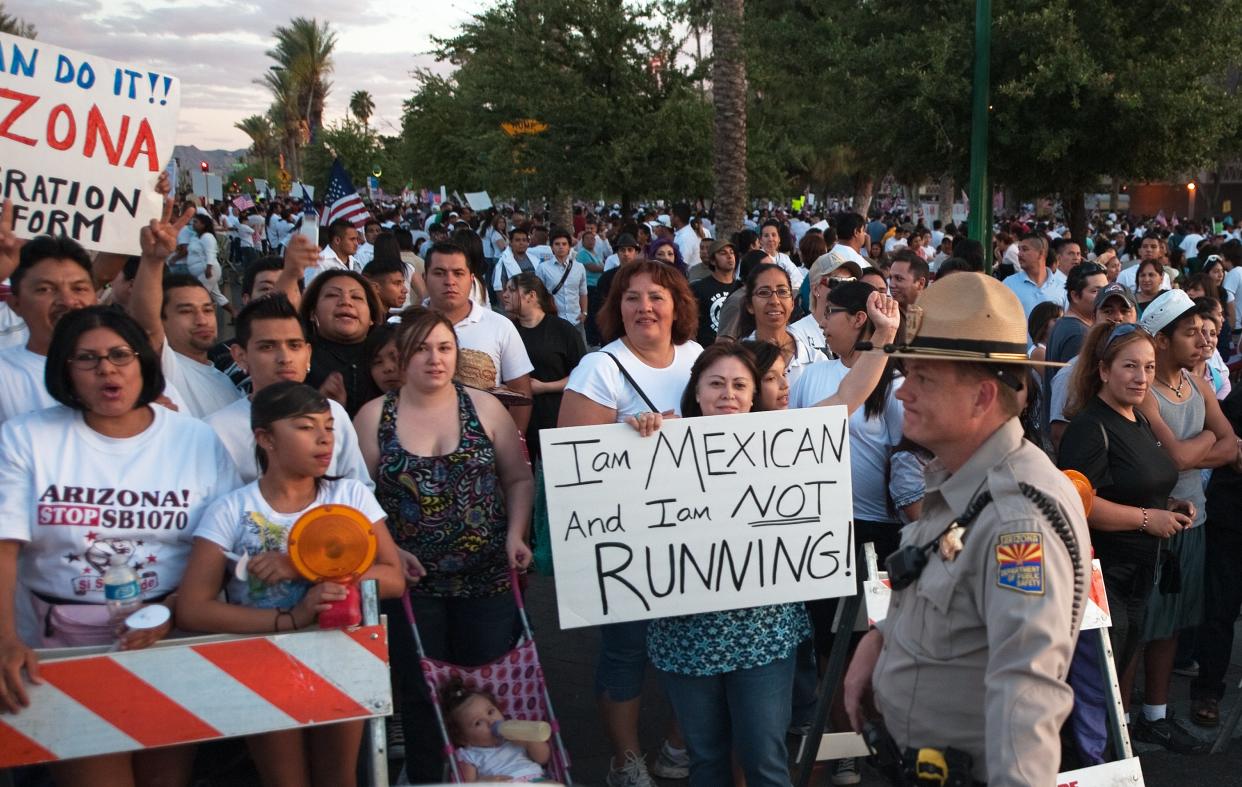Arizona police under fire after officer claimed he could ‘smell’ illegal immigrants

The Arizona State Police are under fire after it was revealed that a state trooper attempted to arrested a group of Hispanic people because he thought they “smelled” like undocumented migrants.
On 16 April, a state trooper named Travis Smith pulled over a van on Interstate Highway 10 because it was going 60 mph in a 65 mph zone, and because he thought the driver and a passenger, who was wearing “camo style clothing”, were “staring straight ahead, avoiding eye contact”, according to an incident report about the arrest obtained by the Arizona Mirror.
“I exited my patrol car and approached the side of the van,” Mr Smith wrote in his report. “The passenger window was rolled down and I immediately smelled an odour that was consistent with smuggling of illegal aliens from past experiences. Once I was at the passenger window, I noticed numerous persons in the van and the driver looked scared.”
Eventually, after interrogating the driver, officers ticketed the driver for having a suspended licence and driving without insurance, and they fingerprinted 17 men inside the van and released them.
Civil rights advocates have raised alarms about using such vague factors – camo and eye-contact – to attempt an arrest and potentially imperil someone’s immigration status, and say the stop represents the kind of thin pretexts used to make racist stops under a controversial 2010 law called SB 1070, which requires law enforcement to inquire about suspects’ immigration status if they have a vaguely defined “reasonable suspicion” they might be in the country illegally.
“You can’t smell someone’s immigration status,” Billy Peard, an immigrant rights advocate and former attorney with the American Civil Liberties Union of Arizona, told the Mirror, adding, “You are not supposed to be fingerprinting people because of a civil infraction, there’s no reason for that.”
The Arizona Department of Public Safety has since apologised, saying odour isn’t an appropriate factor to consider under SB 1070, which has been challenged numerous time on civil rights grounds.
The report also notes that other drivers weren’t obeying the speed limit either, going 70 mph, but the officer elected to pull over the van full of Hispanic men.
Arizona in recent years has been famous for its anti-immigrant police crackdowns, led by the former Maricopa County sheriff and politician Joe Arpaio, whose officers were found in a landmark 2013 verdict to have racially profiled and targeted Hispanic people. Even after Mr Arpaio left office, studies have shown Hispanic people in Phoenix are still stopped for longer, and are more likely to be searched and arrested.
During the stop, the driver, a US citizen named Pedro Joshua Bustos, offered an inconsistent story and eventually admitted to picking up the men in the desert near the border town of Douglas, and transporting them to an undisclosed location for a $10,000 payout, according to police.
In addition to the civil rights uproar, Republicans in the state were furious that federal immigration authorities didn’t immediately assist with the stop after the trooper alerted them.
The Biden/Harris administration needs to get its head out of the sand when it comes to the crisis at our border. This lack of action defies all logic, and flies in the face of the law. 1/ https://t.co/Y5xUO0aQCi
— Doug Ducey (@dougducey) April 16, 2021
In February, the Biden administration directed immigration authorities to focus on pursuing undocumented migrants deemed to be national security threats.
Read More
Arizona refurbishes gas chamber in push to resume executions
Kamala Harris has another tense clash over when she’ll visit the US-Mexico border

